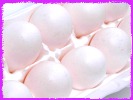Egg Allergy Basics

Egg allergy mostly occurs in children. It is generally outgrown. Usually allergic reaction is to the egg whites.
Severity of the allergy often depends on the way the eggs are cooked. Raw egg whites are more likely to cause allergic reactions than the thoroughly cooked ones.
Egg allergy is an allergy to egg proteins. When one of these proteins comes in contact with our body, the immune system treats it as a foreign object and releases antibodies (Immunoglobulin E) to fight it. This causes allergic reactions. Visit allergies section to read more.
Some reactions to eggs are immediate and very severe. The allergy may affect skin, breathing or GI tract.
Egg Allergy Symptoms:
- Rash
- Hives
- Nasal congestion
- Asthma
- Difficulty breathing
- Coughing
- Swollen throat and tongue
- Crampy abdominal pain
- Vomiting
- Diarrhea
- Nausea
- Anaphylactic shock (collapse)
Anaphylactic shock (collapse) is a very severe life-threatening allergic reaction. Symptoms develop very fast and medical assistance should be sought immediately.
Most common symptoms are swollen face and throat, hives, abdominal pain, vomiting, diarrhea, low blood pressure. First aid should be an adrenaline injection. If your baby had anaphylactic shock as a reaction to eggs, analyze his/her surroundings carefully to eliminate potential triggers. Avoid eggs going forward.
If your baby’s lips, tongue, face are swollen, and he/she has trouble breathing or swallowing, call 911.
Salmonella contamination - a health condition caused by salmonella-contaminated eggs - has several symptoms similar to an egg allergy (diarrhea, vomiting). If these are combined with sore joints, consult your doctor.
Salmonella contamination is associated with eating undercooked, raw, frozen, or powdered eggs. Make sure the eggs you eat are fresh, thoroughly cooked and desirably organic and coming from free-range chickens.
Breastfeeding through Egg Allergy
If you have a family history of allergies or if an allergy is suspected in your baby, breastfeeding is a must. Our immune system treats every object that comes in contact with us as a foreign body. As our immune system matures it learns to accept most of the “foreign” bodies. So if your baby is prone to allergies, the later he/she comes in contact with a potential allergen, the better the chances that the immune system will react normally to it.
Since most allergies are outgrown, by breastfeeding your baby for as long as you can, you increase his/her chances of living allergy-free. I simply can’t stress enough the importance of breastfeeding for allergic babies!
When starting solids, introduce eggs last.
Allergy to eggs can be tested with a blood or a skin test. You
can also try an elimination diet if you notice allergy symptoms in you or
your baby. Try eliminating egg products for two- three weeks and see if the
symptoms go away. If they do (and provided they were mild), try re-introducing eggs into your diet. In cases of severe life-threatening symptoms, don’t
re-introduce the allergen. Talk to your doctor. Visit Allergy Testing section to read more.
Your doctor will probably recommend you carrying an EpiPen (an epinephrine auto-injector), if your allergic reaction is severe.
If you or your baby is showing allergic reactions, start a food diary and track all the foods and snacks. It will make it easier for the doctor to make a well-informed diagnosis.
Everyday Must-Knows
If you or your baby is confirmed to be allergic to eggs, here is what you need to know:
- Many people allergic to eggs show allergic reaction to chicken too
- Some people allergic to chicken eggs can tolerate duck and turkey eggs just fine
- Some people show no allergic reaction to thoroughly cooked eggs as opposed to all other variations
- If you see albumin, ovomucin, livetin, ovovitellin, vitellin, yolk, globulin, ovomucoid on the labels, the food contains eggs
- Battered, bread-crumbed and coated meat and seafood dishes may contain eggs
- Dressings, sauces, marinades may contain eggs
- Most wheat-containing foods also contain eggs
- Ice-cream and marshmallows contain eggs
- Mayonnaise contains eggs
- Root beer and some wines contain eggs
- Eggs are used to manufacture vaccines (mumps, measles, rubella, flu)
There are many products with egg substitutes in stores today. However, it is always best to buy ingredients in their raw form and cook at home. Use egg-free baking powder for baking.
There is a great variety of dishes that you can cook without eggs, so it wasn’t too hard to stay egg-free till my son outgrew the allergies (read my story here). You can do it too!
There are many ways to show your love and devotion to your kids and to win their trust. Breastfeeding is the most natural one.
Yours,
Viktoriya
Back to top of Egg Allergy>Food Allergies>Breastfeeding Home










